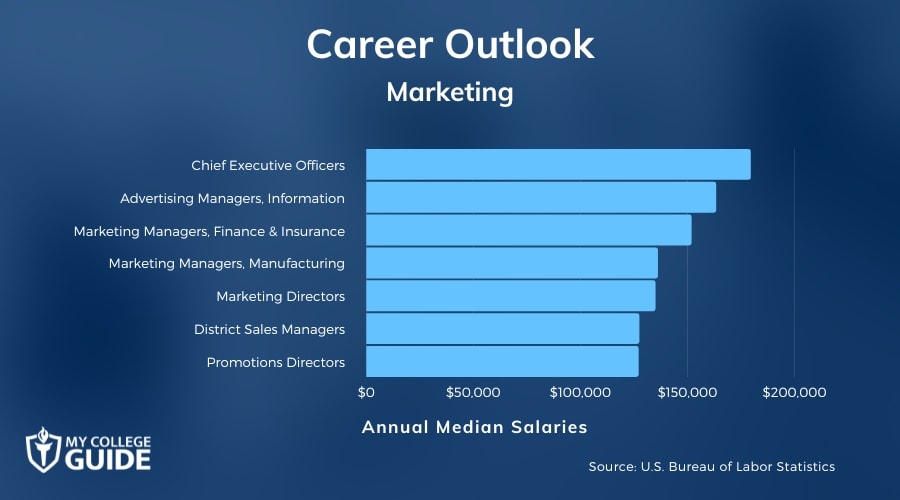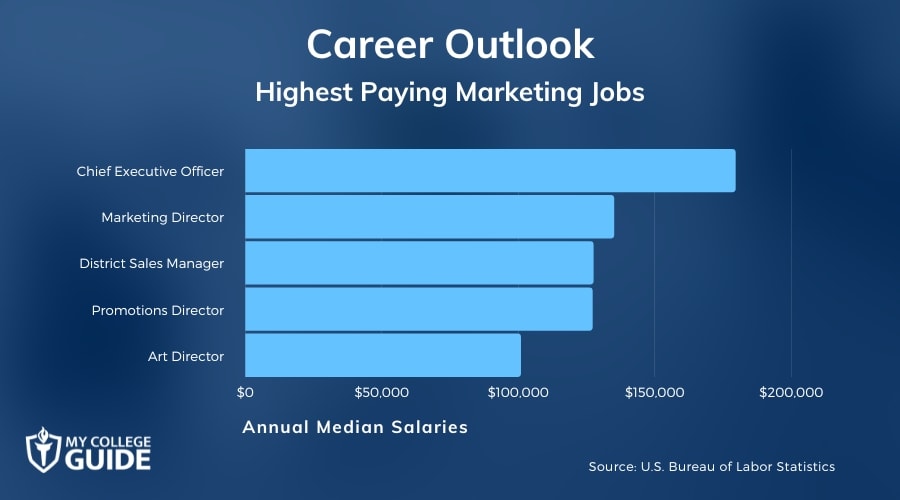For those that have earned a degree in marketing, there are a number of exciting marketing careers to utilize your unique skills in the fast-paced corporate world!

Whether you are interested in administration and sales or want to be on the frontline of managing a business’s marketing initiatives, there are many career paths available to help you achieve your long-term goals. The world of marketing is a specialized department within a business that is essential for maintaining profits and expanding the growth and outreach of an organization.
Editorial Listing ShortCode:
Through the development of strategic marketing plans and public relations, marketing professionals help to showcase a company’s brand, products, and services to the general public.
What Can You Do With a Marketing Degree?

If you’re wondering what can I do with a marketing degree, it’s important to know that there are a number of exciting careers within the field of marketing. While most graduates start out their careers in entry-level positions, in many job paths you may have a great potential to work your way up the ladder to management and executive positions.
While many entry-level positions offer annual pay that is on par with the national average across all occupations, those who have worked their way up to leadership positions can enjoy an annual salary of well over $100,000 a year (U.S. Bureau of Labor Statistics).
Editorial Listing ShortCode:
With a marketing degree, you can choose to stay on the creative side of the business and work directly in marketing and sales. When choosing to work with marketing and sales, you can branch out to promotions and marketing materials which can give you artistic freedom if you have an artistic side. This can be a good path for a graphic designer who is interested in the business world.
If you prefer a more analytical approach to marketing, there are many careers with a marketing degree that allow you to use those skills such as market research analyst, survey researcher, or even work your way up the corporate ladder as a sales or marketing manager.
10 Things You Can Do with a Degree in Marketing

There are several types of marketing degree careers, such as marketing manager, market research analyst, and fundraising, sales, and promotions manager.
When debating what to do with a marketing degree, keep in mind the various possibilities. Some careers concentrate on organization and public speaking, such as public relations managers and specialists, while others focus more on creative thinking or analysis including survey researchers, graphic designers, and art directors.
A marketing degree can help you gain essential knowledge and skills commonly used in numerous types of marketing jobs. The positions listed below show what you can do with a marketing degree from data provided by the U.S. Bureau of Labor Statistics (BLS).
1. Marketing Manager

Projected Job Growth: 10%
Skills: Analytical, Critical Thinking, Interpersonal
Marketing managers think of ways to increase customer satisfaction for organizations through marketing strategies and methodologies. These professionals monitor consumer data trends and analyze product and service demands to help businesses increase their profits.
Marketing managers typically initiate market research studies, develop pricing strategies, and meet with clients.
2. Market Research Analyst

Projected Job Growth: 19%
Skills: Analytical, Detail Oriented, Good Communicator
Market research analysts focus on analyzing consumer and market trends and prepare their findings into reports or graphs for their clients.
One of their main responsibilities is to collect data to inform organizations on how to appeal to customers and promote products and services. These professionals may be employed by management, scientific, and technical consulting services, finance and insurance, and various types of companies.
3. Promotions Manager

Projected Job Growth: 7%
Skills: Creativity, Organizational, Decision-making
Promotions managers are responsible for directing and coordinating various promotional programs and events for businesses. These professionals may develop promotional plans in the form of advertisements, product endorsements, or special offers to attract consumers.
Some common responsibilities of promotions managers might include planning campaigns, consulting with clients, and overseeing other marketing staff.
4. Public Relations Manager

Projected Job Growth: 8%
Skills: Interpersonal, Presentation, Leadership
A public relations manager helps an organization or client maintain a positive public image. They might communicate to the public on their client’s behalf, understand how to reach specific audiences, and prepare press releases or other information for the media.
Public relations managers also consult with their organization or client on the latest trends and work with other departments, such as advertising and promotions.
5. Public Relations Specialist

Projected Job Growth: 8%
Skills: Interpersonal, Good Communicator, Organizational
A public relations specialist may share some of the same responsibilities as a public relations manager. These professionals typically write press releases, respond to media requests, and evaluate public opinions about their clients or business.
Public relations specialist positions are also called communications or social media specialists. Most public relations specialists work for educational, advertising, public relations services, or the government.
6. Fundraising Manager

Projected Job Growth: 10%
Skills: Creativity, Decision-making, Organizational
Fundraising managers develop and coordinate fundraising campaigns for various businesses and organizations. They may work for nonprofits, the government, or the entertainment industry.
Some common responsibilities a fundraising manager may carry out on a daily basis include developing fundraising strategies that align with budget plans, coordinating events, applying for grants, and supervising staff.
7. Survey Researcher

Projected Job Growth: 6%
Skills: Analytical, Critical Thinking, Detail Oriented
A survey researcher is responsible for analyzing various forms of data. They use surveys to collect data on people’s opinions or beliefs. Surveys may come in the form of polls, questionnaires, or interviews.
Survey researchers may be employed for marketing services to analyze consumer data and trends and help a company get a better understanding of what the public thinks about the brand or products and services offered.
8. Sales Manager

Projected Job Growth: 5%
Skills: Customer Service, Leadership, Good Communicator
The responsibilities of sales managers can vary depending on the type of company or organization they work for. Sales managers may work in retail, wholesale trade, finance, and insurance, or for professional or technical services.
Some common duties a sales manager may have include gathering and analyzing sales statistics, developing plans to attract new customers, preparing budgets, and monitoring consumer trends.
9. Graphic Designer

Projected Job Growth: 3%
Skills: Creativity, Computer Literacy, Time-management
Graphic design is the creation of visual content that looks appealing. Graphic designers that work in marketing typically create marketing materials for advertisements, social media, or other platforms used to reach consumers.
Responsibilities may differ depending on the organization, but graphic designers typically design layouts, create logos and other visual elements, and meet with clients and art directors.
10. Art Director

Projected Job Growth: 4%
Skills: Creativity, Leadership, Good Communicator
An art director creates visual styles and images that an organization can use for its brand or products and services. This is a leadership position that involves supervising and coordinating with other visual design professionals to develop art and layouts.
They also meet with clients to get an understanding of their desired artistic style, present design plans or layouts, and make decisions on how a brand should be visually represented.
Online Marketing Degrees

Marketing degrees are available at the associate’s level and higher. Each type of marketing degree offers a different depth of discussion on marketing strategies, roles, and methodologies.
- Associate’s in Marketing: This degree might be appealing to students who want to explore their interests in the marketing industry further before deciding on a career path. Professionals with an associate’s in marketing may be qualified for office and store management positions or other entry-level marketer jobs.
- Bachelor’s in Marketing: A bachelor’s degree offers students the opportunity to take more specialized courses that align with their specific interests. General marketing skills and knowledge are explored in this program to prepare students for various marketing degree careers.
- Master’s in Marketing: If you want to potentially increase job opportunities and your knowledge in the marketing industry, you might pursue a master’s degree. This advanced degree allows students to explore marketing concepts and principles more in-depth and customized to one’s interests.
- Doctorate in Marketing: A doctorate in marketing is more research-oriented than other degree programs. Students who wish to take on higher marketing positions and learn about qualitative and quantitative research methods might be interested in this degree.
Each level of degree in marketing may offer individuals the opportunity to gain useful skills and knowledge to prepare them for a career in marketing.
Marketing Careers & Salaries

As with any career, those who have higher-level education and experience within the field typically make much more per year than those just starting out in their careers.
In the table below, we have put together a comprehensive list of the top 40 marketing careers & salaries according to data provided by the U.S. Bureau of Labor Statistics (BLS). These career ideas will hopefully answer the question of what jobs can you get with a marketing degree and give you an idea of the opportunities available after graduating from a marketing degree program:
| Careers | Annual Median Salaries |
| Chief Executive Officers | $179,520 |
| Advertising Managers, Information | $163,360 |
| Marketing Managers, Finance and Insurance | $151,870 |
| Marketing Managers, Manufacturing | $136,150 |
| Marketing Directors | $135,030 |
| District Sales Managers | $127,490 |
| Promotions Directors | $127,150 |
| Promotions Managers, Public Relations | $126,300 |
| Public Relations Managers | $125,780 |
| Art Directors | $100,890 |
| Fundraising Managers | $100,810 |
| Fundraising Managers, Arts, Entertainment, and Recreation | $99,040 |
| Project Management Specialists | $94,500 |
| Marketing Instructors | $94,360 |
| Management Analysts | $93,000 |
| Sales Managers, Retail Trade | $80,340 |
| Project Management Professors | $78,160 |
| Technical Writers | $78,060 |
| Media Arts Professors | $77,560 |
| Graphic Design Professors | $75,940 |
| Social and Community Service Managers | $74,000 |
| Advertising Copy Writers | $69,510 |
| Market Research Analysts | $63,920 |
| Advertising Editors | $63,350 |
| Public Relations Specialists | $62,800 |
| Media and Communication Workers | $62,340 |
| Executive Assistants | $62,060 |
| Real Estate Brokers | $62,010 |
| Fundraising Officers | $60,660 |
| Advertising Account Executives | $52,340 |
| Graphic Designers, Advertising, Public Relations, and Related Services | $52,050 |
| Graphic Designers | $50,710 |
| Real Estate Sales Agents | $48,340 |
| Art and Design Workers | $48,220 |
| Advertising Photographers | $38,950 |
| Real Estate Administrative Assistants | $37,880 |
| Advertising Sales Agents, Newspaper Publishers | $37,270 |
| Market Research Interviewers | $37,220 |
| Office Assistants | $37,030 |
| Customer Service Representatives | $36,920 |
The business world is competitive, and every day more and more companies compete for sales within a target market. In order to stay relevant within their industry and continue expanding, organizations are always on the lookout for marketing professionals that can help them develop effective strategies to increase profits from the sales of their products and services.
According to the BLS, the marketing career outlook is expected to continue increasing over the next decade. During this timeframe, advertising and promotions managers will experience a 10% growth rate while market research analysts will see a growth of approximately 19%.
If you are looking for a way to combine your management and creative skills into a rewarding career in the corporate world, then marketing may be the right field to showcase your talents. From creating advertising campaigns to project management or sales, there are countless options to utilize your marketing degree in the world of business.
You can also view our Careers in Liberal Arts and Careers in Math guides for more options.
How to Know if a Career in Marketing is Right for Me

If you enjoy staying up-to-date with the latest trends and like to work in a team environment, you might consider a marketing career. Although marketing concentrates on understanding consumer behavior and trends and strategizing, it’s a very versatile field.
Individuals may produce marketing content through graphic design, preparing data tables, graphs, and reports, or specializing in social media marketing. Marketing helps businesses better understand consumer demands and increase profits by building brand awareness through the promotion of products and services.
Some of the main responsibilities of marketing professionals might include:
- Analyzing consumer data and trends
- Establishing positive relationships with clients and customers
- Building brand awareness
- Develop marketing strategies to improve outcomes
Responsibilities can widely vary depending on the type of marketing position. If you enjoy researching and analyzing data, you might be interested in analytical positions like survey researcher or market research analyst. Promotions and fundraising management positions might appeal to you if you enjoy organizing events and networking.
General skills that marketing professionals acquire include interpersonal, communication, analytical, and creativity.
Marketing Licensure and Certifications

Gaining licensure or certification in your marketing career might help you earn a higher salary or increase future job opportunities. It establishes credibility in your skills and knowledge as a marketing professional.
Here are some examples of marketing certifications and licenses:
- Professional Certified Marketer (PCM)
- Marketing Management Certification
- Marketing License
Licensure typically isn’t a requirement for most marketing careers. Obtaining a marketing or advertising license might be required for some professionals in certain states to operate a business that involves advertising or marketing consultation. Although certifications aren’t a requirement for many marketing jobs, some employers may favor applicants with certification.
Is Financial Aid Available?

Financial aid may help you pay for college tuition or other school expenses. Colleges and universities determine prospective students’ financial aid eligibility based on a number of factors.
To find out if you’re eligible for federal student aid, you can start by submitting the Free Application for Federal Student Aid (FAFSA). Other ways to obtain financial support can come from scholarships. Scholarships may be offered by schools based on athletic or academic merit. They’re also offered by various organizations and may be available to virtually any student.
What Is a Marketing Degree?

A marketing degree is a reputable degree program that allows students to learn essential business, communication, and creative skills that can be utilized across a broad range of industries.
Once you have earned your degree in marketing, you will be able to take on roles within an organization that focuses on developing advertising campaigns, brand messaging, and creating a positive relationship with current and prospective clients.
Throughout your educational journey, you will take several marketing-specific courses in addition to the general education courses required to earn your degree. These classes will cover a variety of topics and typically include:
- Strategic marketing skills
- Advanced business communication
- Market research and analysis
- Microeconomics
- Business leadership and management
Now more than ever, adult students are pursuing their careers or juggling family obligations while they earn their marketing degrees.
To help you balance your busy schedule, many colleges and universities are offering online marketing degrees for marketing and business. There are several advantages to earning your degree online, and it may even be possible to complete your degree program in less time than traditional, on-campus schooling.
Is Marketing a Good Major?

Yes, marketing is a good major for many undergraduate students. Marketing is a versatile field that can appeal to many types of professionals.
Earning a marketing degree may provide you with useful communication and analytical skills that can be applied to a wide range of careers, such as marketing analyst, marketing manager, or social media marketer. According to the BLS, the median salary of marketing directors is $135,030 per year. Level of education and experience and location may impact job availability.
What is the Job of Marketing?

Marketing involves building brand awareness by promoting products and services to help increase the profits of a business. Marketing professionals analyze data to create marketing strategies that help a business achieve its goals.
Some responsibilities of marketing professionals may include creating promotional content, establishing and maintaining positive client and customer relationships, and engaging customers through various forms of media.
Marketing is important for a business to get the word out about its products or services. Effective marketing strategies engage customers through attractive promotions, which can be invaluable to a business’s success.
What Skills Do You Learn in Marketing?

Skills you might acquire through a marketing degree and work experience can differ depending on your specific interests. Some marketing careers focus more on the creative aspects of the field, while others focus more on research, organization, or presentation.
There are a number of skills that can be essential to performing daily marketing responsibilities, such as:
- Written and verbal communication
- Public speaking and presentation
- Analytical skills
- Creativity
- Problem-solving and critical thinking
Marketing coursework may help you develop these skills. Some common coursework that marketing majors pursuing a bachelor’s degree might take include consumer behavior, marketing research, and competitive marketing strategy.
Where Do Marketing Majors Work?

Marketing professionals are employed by various types of organizations and businesses that need help managing their brands and promoting their products and services.
Some marketing professionals are self-employed, while others work for advertising, public relations, management, or consulting services. A marketing major’s work environment can vary depending on the type of marketing services they specialize in.
Some marketing professionals mainly work in an office setting. Depending on the career, a number of marketing professionals travel frequently for promotional events or client meetings.
How Much Do Marketing Majors Make?

Salaries can vary depending on one’s job title, level of education, work experience, and geographic location. According to the Bureau of Labor Statistics, the median annual salary for advertising and promotions managers is $127,150.
Graphic designers earn a median salary of $50,710 per year and market research analysts earn a median annual pay of $63,920. Senior-level positions typically offer higher salaries than entry to mid-level jobs in marketing. A number of management positions, such as public relations, fundraising, and sales managers earn an annual median salary that exceeds $100,000.
What Are the Highest Paying Marketing Jobs?

Some of the highest-paying marketing jobs fall within the management, director, or executive positions. According to the BLS, here are some of the highest-paying marketing jobs and their median annual salaries:
- Chief Executive Officer: $179,520
- Marketing Director: $135,030
- District Sales Manager: $127,490
- Promotions Director: $127,150
- Art Director: $100,890
Depending on the employer, you may need additional education or work experience to qualify for some of these jobs.
What’s the Difference Between Marketing vs. Advertising?
Marketing and advertising both help a business appeal to consumers, but there are some differences between these two industries. Key differences between marketing and advertising include:
| Marketing | Advertising |
|
|
Advertising is a type of marketing strategy, often in the form of paid or owned media. Marketing uses consumer trends and data to build a business’ brand that aligns with its mission.
Is a Marketing Degree Worth It?

Yes, a marketing degree is worth it for many professionals. It may provide you with a broad skill set that can be applied to numerous careers and industries.
A marketing degree might be rewarding for individuals who like to interact with others, analyze data, and think creatively. Several careers in marketing are expected to experience job growth because businesses want help attracting consumers.
According to the Bureau of Labor Statistics, marketing manager positions are expected to experience a 10% increase in job growth over the next decade. Market research analyst jobs are projected to have a 19% increase.
Getting Your Marketing Degree Online

A marketing degree is a multidisciplinary program that allows students to explore marketing strategy, research methods, consumer behavior, and effective communication. Skills learned in marketing can also be applied to other careers in different industries.
You might find interest in a marketing degree if you like working with other people and want to make a difference in a business’s success. Marketing can be an ideal industry to enter for creative individuals or professionals who enjoy research and love learning new things.
To begin your journey toward a marketing career, you can research accredited online marketing degree programs that interest you and align with your aspirations.
